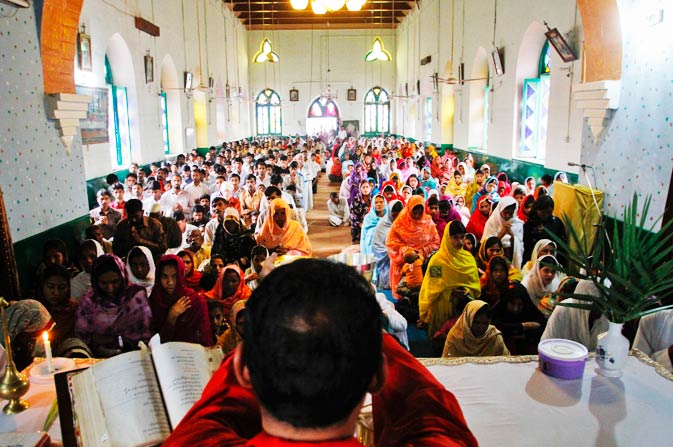By: Zara Amoon
Easter, one of the most significant events in the Christian calendar, was celebrated this past weekend by Pakistan’s Christian community with a blend of solemnity, joy, and cultural expression. Despite making up just over 1.2% of the country’s population, Christians across Pakistan observed the holy day with deep spiritual devotion and vibrant traditions, reflecting both their faith and resilience.
The observance of Easter in Pakistan began with the 40-day season of Lent, starting on Ash Wednesday. Churches nationwide reported increased attendance during this period, as worshipers engaged in fasting, prayer, and charitable acts. Special services held throughout Lent culminated in Holy Week, marked by religious gatherings and processions.
Holy Week Observances
Holy Week included Palm Sunday, Maundy Thursday, Good Friday, and Holy Saturday—each observed with unique rituals. On Palm Sunday, congregants carried palm branches to symbolize Jesus’ entry into Jerusalem. Maundy Thursday services focused on the Last Supper, with some churches organizing traditional foot-washing ceremonies.
Good Friday was marked with solemn services reflecting on the crucifixion of Jesus Christ. Many Christians observed fasting and wore black or white to express mourning. Holy Saturday, a quieter day of reflection, led into Easter Sunday with anticipation.

Easter Sunday Celebrations
Easter morning began with sunrise services across the country, many held in open-air spaces or church courtyards. Sermons centered on the resurrection of Christ and the message of hope it brings. Church choirs sang traditional hymns such as “Christ the Lord is Risen Today,” while Holy Communion was offered in many congregations.
Churches were adorned with white flowers, banners, and crosses. Attendees wore bright clothing, symbolizing the joy of resurrection. Following the services, families gathered for festive meals. Dishes included a mix of traditional Pakistani cuisine—biryani, karahi, and kebabs—along with sweet treats like halwa and kheer. In many neighborhoods, Christians shared meals with Muslim neighbors in a display of interfaith harmony.
Cultural Expression and Community Spirit
Easter in Pakistan is not only a religious event but also a cultural occasion. In major cities such as Lahore, Karachi, and Faisalabad, local churches and Christian organizations hosted Easter bazaars and fairs. These included food stalls, games, and musical performances. In Punjab, processions and reenactments of biblical scenes were seen in some towns.
House-to-house visits were common, with children receiving sweets, small gifts, or “Easter money.” Community engagement remained a key focus, strengthening ties among neighbors and faith communities.
Youth and Children’s Participation
Churches made efforts to involve youth in Easter observances. Sunday schools organized plays, dramas, and arts-and-crafts sessions centered on the resurrection theme. Easter egg hunts, though not traditionally Pakistani, are growing in popularity in urban Christian communities, often held in church lawns or public parks.
Celebrating at Home
In many households, Easter was celebrated with quiet devotion. Families decorated homes with candles, flowers, and religious symbols. Scripture readings from the Gospels of Matthew, Mark, Luke, and John were shared, followed by family prayers and festive meals. Some families also invited neighbors, including non-Christians, promoting interfaith goodwill.
Security and Social Context
Easter celebrations in Pakistan took place under heightened security, especially in cities with large Christian populations. Police presence was noted outside churches in Lahore, Islamabad, and Karachi. No major incidents were reported.
Despite ongoing challenges, Christian communities demonstrated resilience. Many churches collaborated with local authorities to ensure peaceful celebrations. Online services and social media outreach were also utilized to share messages of hope and unity.
Charitable Initiatives
Easter also saw an increase in charitable activities. Christian organizations and churches distributed food packages to underprivileged families and visited hospitals, orphanages, and senior care homes. Volunteers emphasized that acts of service are central to the meaning of Easter.
Interdenominational Unity
Churches of various denominations—Catholic, Anglican, Presbyterian, Methodist, and Pentecostal—came together in ecumenical services and community gatherings. Events promoting Christian unity were held in cities across the country, with shared prayers and joint choirs contributing to the spirit of collective worship.
Recognition and Media Presence
In recent years, public recognition of Easter has grown in Pakistan. Television channels and newspapers carried Easter messages and coverage of church services. Government officials, including the President and Prime Minister, extended greetings to the Christian community, highlighting Pakistan’s religious diversity and commitment to interfaith harmony.
Christian leaders encouraged more media engagement, urging communities to share stories that highlight positive contributions by Christians in education, healthcare, and social development.
A Message of Hope
For Christians in Pakistan, Easter remains a profound affirmation of hope and spiritual strength. In the face of social and security challenges, the celebration of the resurrection continues to inspire faith, unity, and compassion.
As churches echo the message, “He is Risen,” and families gather in prayer and celebration, Easter reaffirms its enduring significance in the lives of believers across the country.


